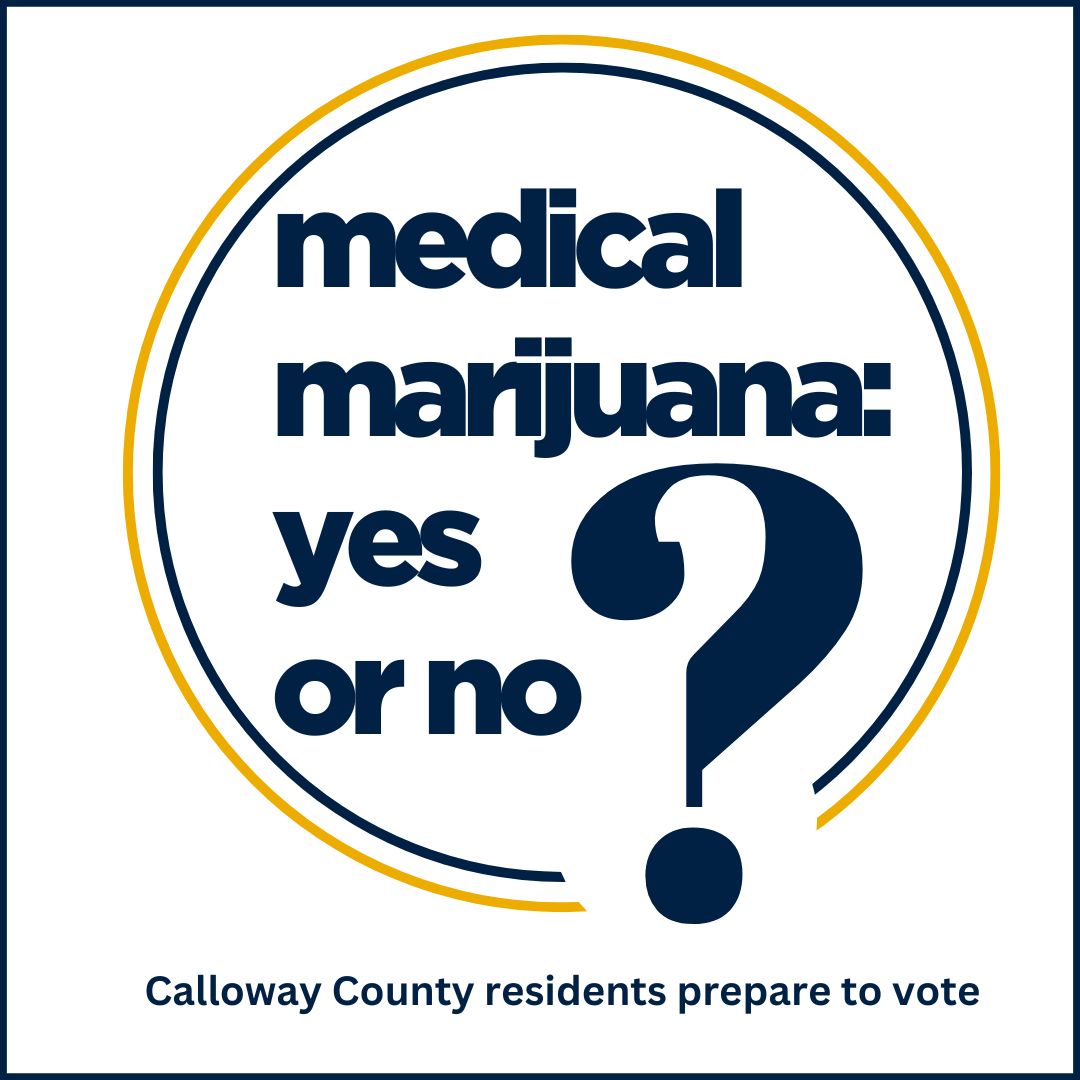Calloway County has joined with other Kentucky counties to introduce a resolution on the fall ballot to decide if the county should allow medical marijuana businesses to operate within its border.
This resolution follows the passage of Senate Bill 47 in 2023, which legalized medical marijuana in the state of Kentucky starting Jan. 1, 2025. Under this bill, anyone diagnosed with a qualifying medical condition who obtains a written certification from a medical cannabis practitioner may submit an application for a medical marijuana card starting Jan. 1.
Qualifying medical conditions include: any form of cancer, chronic or debilitating pain, epilepsy, multiple sclerosis, muscle spasms, chronic nausea and others.
The list of conditions is less than what was included in the November 2022 executive order signed by Gov. Andy Beshear which allowed Kentuckians who suffered one of 21 listed medical conditions to legally possess marijuana purchased legally in other states. This executive order remains in effect until Jan. 1 when the new bill takes effect. Senate Bill 337 was introduced earlier this year and tried to expand the list of conditions covered under Kentucky’s medical marijuana legislation, but did not pass committee.
SB 47 also includes restrictions on how marijuana is consumed. Under the bill, marijuana will be available in the form of edibles, oils, vapes and raw plant matter. However, the law explicitly disallows the consumption of raw plant matter through means of smoking.
House Bill 829, passed earlier this year, allows local cities and counties to decide if cannabis businesses will be allowed to operate within their territory. Under this new law, a number of counties, including Calloway County, have introduced resolutions to decide if cannabis companies will be allowed to operate within city or county territory. The resolution will be brought before voters on the November ballot.
Comet Gill, freshman theater and history major, said he supported the legalization of medical marijuana after seeing how it benefited his sister, who suffered from cancer.
“My sister had cancer and it did benefit her,” Gill said. “They went up to Cincinnati to get medical marijuana and that benefited her. So I do have positive opinions on medical marijuana.”
Gill also said he supported the recreational legalization of marijuana, and, if eligible, that he would receive a medical marijuana card.
Corey Brown, freshman computer science major, said medical marijuana could serve as a good alternative to opioid pain relievers, drugs which are now known for causing addiction.
“Medical use is practically just a better pain reliever. That’s pretty much all I see is that as a better pain reliever,” Brown said. “Less pill-wise because some people don’t like the idea of taking pills because it could cause them to relapse from other types of stuff that they’ve taken before.”
Alisa Helt, junior nursing major, had a differing opinion on marijuanas relation to opiods. According to her, marijuana could be similar to opiods in that it serves as a gateway to addiction.
“I think there could be a lot of issues on it… I mean, I think we saw a big problem when they legalized opioids for pain meds and I feel like that could probably be the same with marijuana too, just like leading to more overdoses and more addiction,” Helt said. “I mean, I know that it doesn’t have the same physical effects, but I think it could have the same psychological effects where it’s like oh, now it’s like a little bit more standardized to go to opioids as pain meds or go to marijuana as pain meds. And so that’s kind of like a gateway into being addicted to that as something other than a pain med.”
One student, who preferred to stay anonymous, said marijuana legalization could be a benefit to the state’s farmers, and that its legalization would bring in needed money for the state.
“I live in Kentucky and I get to see field after field of corn, beans and everything else. I’m related to farmers and it would just open up a lot more opportunities for farmers,” the anonymous student said. “I think it would put more money into agriculture so then we can do more agricultural planning and farmer support.
Thomas Puckett, freshman computer science major, also said medical marijuana could bring job opportunities to the state.
“It will create jobs, and it’s a better alternative to tobacco,” Puckett said.
Cory Crick, freshman physics major, was less optimistic about marijuana’s benefit to the community. While Crick said he supported medical marijuana, on the issue of marijuana in general he said it devalued communities and made them less amenable.
“I’ve been to D.C. a couple of times and they have fully legalized marijuana and from my experience, it pulled away from the experience of D.C. I think it detracts, especially from tourism,” Crick said. “Marijuana, I would say you can smell it from miles away, I guess it’s worse than smoking, the smell of it. I think it would heavily detract from that and remove value from communities”
On the topic of a dispensary opening in Murray, Cammy Pillow, sophomore music composition major who uses they/them pronouns, said they believed it was fine as long as the dispensary didn’t risk targeting college students
“I think it might be a bad idea to have it very near to the college campus, but as far as having one in Murray, that would probably be fine,” Pillow said. “It’s pretty much targeting young students to intentionally or otherwise get them addicted to it.”
For more information on medical marijuana, and what its 2025 legalization will entail, visit the Kentucky Office of Medical Cannabis’s website at https://kymedcan.ky.gov/





























































































